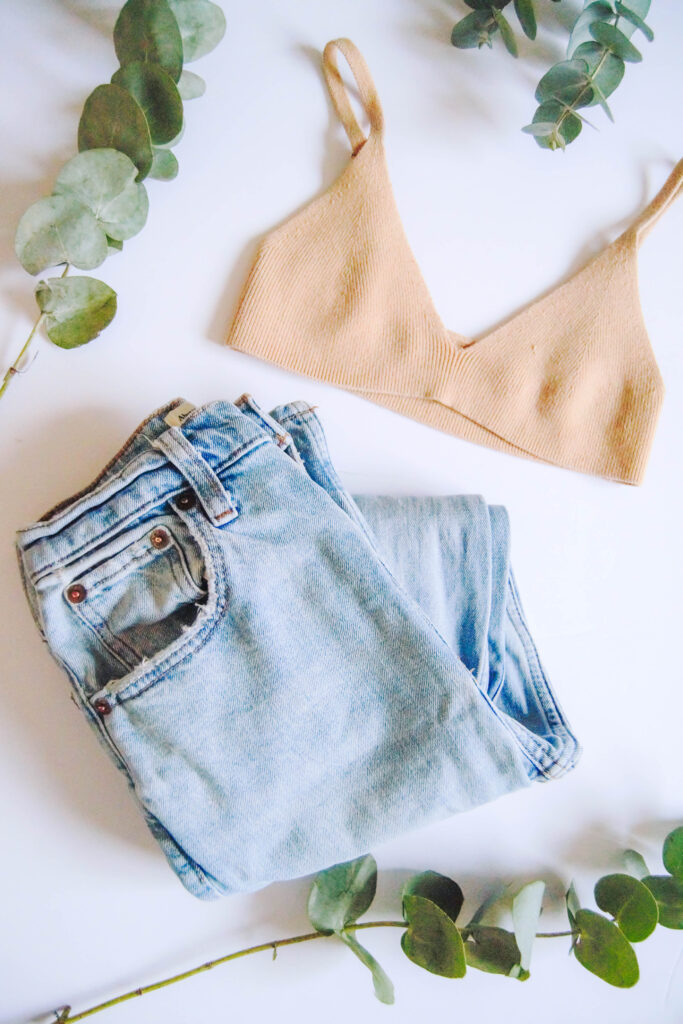
Navigating the search for sustainable textile manufacturers can seem like an impossible task. However, if you happen to spot any of the sustainable Lenzing fabrics listed in your clothing composition tag, know that you’re on the right track. Lenzing is a textile manufacturer that specializes in producing semi-synthetic fabrics. This article aims to delve into the world of Lenzing fabrics to equip you with the knowledge needed to recognize and appreciate better slow fashion choices.
Sustainable Lenzing Vocabulary
Before we dive in, let’s familiarize ourselves with some key terms to help you better grasp Lenzing’s groundbreaking innovation of one of the greatest sustainable textile manufacturers.
Fiber Vocab
Viscose, modal, and lyocell are all semi-synthetic fibers that undergo chemical processing to transform natural cellulose, such as wood pulp, into fabric.
Viscose
Derived from wood pulp, viscose use a dissolvent chemicals called carbon disulfide and water to break down the pulp. The process then extrudes the resulting solution through tiny holes called spinnerets to form threads and yarn.
Is viscose a sustainable fabric?
While viscose is one of the most popular fabrics in the fashion industry due to its affordability and versatility, it is not considered a sustainable fabric. The production process of viscose often uses toxic chemicals, leading to pollution and environmental harm. Additionally, garments made from viscose may exhibit poor wearability and durability, as the fibers tend to break down more easily compared to other alternatives.
Modal
Think of Modal as the second generation of viscose. Modal’s production process is similar to viscose, involving the breakdown of natural cellulose to create fibers. However, Modal is extruded through larger openings instead of being extruded through numerous tiny holes, resulting in a stronger fiber.
Lyocell
Representing the latest generation of semi-synthetic fibers, lyocell uses a non-toxic dissolvent chemical called Amine Oxide to break down the cellulose. This dissolvent is recyclable which promotes a sustainable, closed-loop production system.
Sustainability Vocab
Closed-Loop System
In a closed-loop system, the supply chain repeatedly reuses materials to produce new products. This approach conserves natural resources and minimizes waste sent to landfills.
Biorefinery
Biorefinery converts raw materials into various eco-friendly products, such as biofuels, chemicals, and other materials utilized across different industries. Biorefineries play a crucial role in waste reduction and the promotion of environmentally friendly products.
FSC®
The Forest Stewardship Council is an international organization that dedicates itself to promoting responsible forest management across the world.
Trademarked Sustainable Lenzing Brands
Lenzing
Lenzing Group is one of the superior sustainable textile manufacturers that oversees trademarked brands such as TENCEL™, ECOVERO™, and VEOCEL™.
TENCELL™
TENCELL™ represents Lenzing’s trademarked lyocell fiber. Originally established in 1992 as an independent company producing soft denim, it was later acquired by Lenzing in 2004.
ECOVERO™
Lenzing ECOVERO™ is its environmentally conscious viscose fibers, with a reduced environmental impact compared to conventional viscose.
VEOCEL™
VEOCEL™ offers sustainable solutions for health and environmentally friendly hygiene products. These include biodegradable applications such as baby wipes, facial sheet masks, and surface cleaning products.
REFIBRA™
REFIBRA™ stands as a cutting-edge textile technology that combines pre and post-consumer cotton waste with TENCEL™ lyocell fibers, introducing a new era of sustainable fabric production.
What is Lenzing Fabric?
The Lenzing Group, headquartered in Austria, produces both fibers and textiles. As the overarching entity, Lenzing oversees the production of TENCEL™ Lyocell, LENZING™ ECOVERO™, and VEOCEL™ fibers, catering to various industries including fashion, beauty, and hygiene. Lenzing operates primarily as a business-to-business (B2B) manufacturer, supplying its textiles to a diverse range of well-known brands and retailers.
A History of Sustainable Lenzing
The history of Lenzing began as one of the top sustainable textile manufacturers in 1892 as a pulp and paper mill. Its strategic location, with access to resources like the Ager River, coal, wood, and railroad access, contributed to its initial success. However, during World War II, the plant fell under German control, operating as “Zellwolle Lenzing” as part of Germany’s pursuit for textile independence. Consequently, this period saw the establishment of a women’s concentration camp in the neighboring community of Pettighofen, where forced labor was rampant under the Nazi regime.
As the war neared its end, the factory faced collapse due to a lack of resources. Upon the arrival of US troops in Upper Austria, Nazi authorities sought to demolish the plant. However, a resistance group successfully defused their bombs, foiling their plans. Despite wartime challenges and with the support of Allied forces and Austrian banks, the Lenzing Group resumed operations in 1947.
The Rise of Lenzing’s Sustainable Strategy
Over the following decades, growing concerns about environmental pollution prompted Lenzing to adopt more sustainable practices. In 1975, Lenzing established a dedicated environmental department to spearhead the development of a closed-loop and biorefinery process, laying down the foundation for Lenzing’s commitment to sustainability. While many viscose plants across Europe shuttered their business, Lenzing not only persevered but flourished, cementing its position as a sustainability leader in the textile industry.
In 2004, Lenzing expanded its portfolio by acquiring TENCEL™ Lyocell, a brand making revolutionary moves in the sustainable semi-synthetic industry. This acquisition allowed Lenzing to triple its lyocell production, reinforcing its status as the premier sustainable fiber manufacturer. Subsequent innovations, including ECOVERO™, VEOCEL™, and REFIBRA™ technology, further solidified Lenzing’s reputation for innovation and sustainability.
In the long run, Lenzing aims to achieve carbon neutrality by 2050, demonstrating its ongoing commitment to reducing CO2 emissions and mitigating environmental impact. The sustainable Lenzing brand remains steadfast in its mission to pioneer sustainable practices and lead the textile industry towards a greener future.
What is Lenzing’s Sustainability Strategy?
Lenzing leads the way to a better world through its commitment to sustainable production. By sourcing sustainable materials, employing a closed-loop system that minimizes waste, and embracing biorefinery practices, Lenzing sets a precedent for responsible manufacturing in the fashion industry, demonstrating a commitment to ethical and sustainable fashion.
Sourcing
The foundation of Lenzing’s sustainability lies in its responsible wood and pulp sourcing. With natural cellulose as the base material for all its fabrics, over 99% of the wood used in Lenzing’s production process originates from sustainably managed forests certified by the FSC®. Most viscose manufacturing resorts to deforestation demolition. Instead, Lenzing primarily produces wood pulp from its plants located in Lenzing (Austria), Paskov (Czech Republic), and Indianópolis (Brazil), in addition to responsibly sourced wood from around the globe.
What are the raw materials for LENZING?
Lenzing predominantly uses eucalyptus for wood, favoring it for its fast growth, adaptability to arid conditions, and low carbon footprint, making it an excellent sustainable choice for raw materials.
Is LENZING biodegradable?
Natural cellulose possesses inherent biodegradable properties, allowing it to decompose naturally over time, thus minimizing its environmental footprint. By integrating natural wood pulp into its production processes, Lenzing not only creates sustainable textiles but also contributes to the preservation of natural ecosystems, further solidifying its position as a leader in sustainable textile manufacturing.
Closed-Loop Systems
Fabric manufacturing typically follows traditional linear production systems, which operate by continuously inputting raw materials and inevitably producing waste as a byproduct of the production process. Sustainable Lenzing production process operates using a circular economy, continuously recycling raw materials within the production process to minimize resource consumption and waste. As an illustration, mirroring the cyclical patterns found in nature, the waste produced today serves as the raw materials for tomorrow.
Biorefinery
Rather than solely extracting wood pulp for fiber production, Lenzing maximizes the value of wood resources by transforming them into a diverse range of products at their biorefineries. Wood serves as a versatile substitute for non-renewable resources like crude oil, offering eco-friendly alternatives for various industries. Through biorefinery practices, Lenzing contributes to the transition from reliance on non-renewable resources to sustainable, renewable solutions.
A Deep Dive into Sustainable Lenzing Products
TENCEL™
Previously under the brand name TENCEL™, Lenzing offers three sustainable textiles: TENCEL™ Lyocell, TENCEL™ Modal, and TENCEL™ Luxe. In 2020, Lenzing TENCEL™ introduced its first certified carbon-neutral fibers, aimed at assisting brands and retailers in reducing their carbon emissions from raw material production.
TENCEL™ Lyocell
These fibers use a closed-loop system derived from sustainably grown wood. Renowned for their softness, high durability, and effective moisture management, TENCEL™ Lyocell is an excellent option for various types of clothing.
TENCEL™ Modal
Known for its long-lasting quality and enduring softness and comfort, even after multiple washes, TENCEL™ Modal offers luxurious comfort, often surpassing the softness of cotton.
TENCEL™ Luxe
TENCEL™ Luxe uses a specialized production process to create extremely fine yarns, resulting in a silky, luxurious fabric, characterized by vibrant color retention and flowing drapery.
LENZING™ ECOVERO™
LENZING™ ECOVERO™ viscose represents Lenzing’s environmentally friendly viscose fibers. Lenzing has engineered LENZING™ ECOVERO™ viscose to possess a significantly reduced environmental footprint compared to generic viscose. ECOVERO™ viscose is certified with the EU Ecolabel, a prestigious certification that attests to its eco-friendly credentials and solidifies Lenzing’s position as one of the leading sustainable textile manufacturers.
This achievement is facilitated through certified wood sourcing and optimized manufacturing processes: ECOVERO™ viscose utilizes 50% less water and emits 50% less CO2 compared to its generic viscose counterpart. Additionally, sodium sulfate, a natural byproduct of viscose production, is separated from the fiber production process and repurposed for high-purity applications in detergents and glass.
LENZING VEOCEL™
LENZING VEOCEL™ offers sustainable solutions for health and environmentally compatible hygiene products. This includes a range of biodegradable applications such as baby wipes, facial sheet masks, and surface cleaning products. Renowned brands like Neutrogena® use VEOCEL™ fibers in their makeup remover wipes, and with its natural composition, will decompose after use.
REFIBRA™ Technology
Lastly, REFIBRA™ represents circular, upcycled, and 100% sustainable technology in the textile industry. This innovative process upcycles pre and post-consumer cotton waste by blending it with TENCEL™ Lyocell. Through a closed-loop system, REFIBRA™ technology breaks down cotton scraps and wood pulp, transforming them into next-generation textiles. This forward-thinking approach not only addresses excess textile waste but also offers a sustainable solution for repurposing fabrics, paving the way for a more circular and eco-conscious textile industry.
Fashion Brands that use Sustainable Lenzing Fabric
Popular Fashion TENCEL™ Brands:
7 For All Mankind
Allbirds
Aritzia
Athleta
Madewell
New Balance
Patagonia
Reformation
Ted Baker
The North Face
Trina Turk
Popular Fashion ECOVERO™ Brands:
American Eagle
ba&sh
Farm Rio
Ganni
J. Crew
Levi
Tommy Hilfiger
Wrangler
Sustainability Considerations Beyond Lenzing
When evaluating the sustainability of a piece of clothing, it’s important to understand that Lenzing produces solely plain white fabrics, which they sell to brands and retailers. While Lenzing manufactures fabrics sustainably, other aspects of garment construction, such as fabric dyeing and waste management, depend on the practices of the brand itself. So, just because a garment is made with Lenzing fabric, it does not guarantee complete sustainability. Understanding the brand’s commitment to sustainability is equally important. Nevertheless, opting for clothing made with Lenzing fabrics represents a positive first step towards sustainability.
It’s also worth noting that not all clothing from brands that work with Lenzing necessarily contain sustainable Lenzing fabric. Make sure you check the composition of the fabric, as it may not exclusively consist of Lenzing fabric or it could contain a blend of Lenzing with other fabrics. Developing the ability to discern sustainable clothing requires attention to detail and a willingness to investigate the materials used in garment production is equally important.
—
Sustainable Lenzing’s practices stands as one of the most sustainable textile manufacturers, pioneering innovative solutions to address environmental challenges. Through their commitment to sourcing sustainable materials, implementing closed-loop systems, and developing cutting-edge technologies like REFIBRA™, Lenzing demonstrates a dedication to reducing their environmental footprint and promoting circularity in textile production. So the next time you see a Lenzing fabric in your clothes, know that you’re contributing to a more sustainable future for the fashion industry and the planet as a whole.
